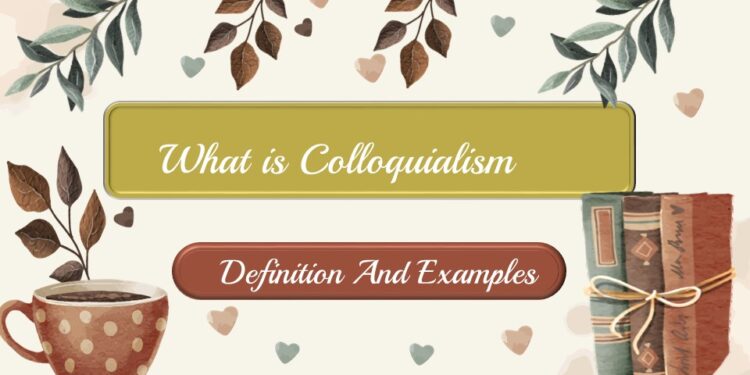What is Colloquialism Definition And Examples
A colloquialism refers to a word, phrase, or expression that is used in informal, everyday language rather than in formal or literary contexts. It is a type of linguistic feature that reflects the way people speak in a particular region, community, or social group. Colloquialisms are characterized by their familiarity, informality, and often their cultural or regional associations.
The use of colloquialisms is prevalent in everyday conversations, where people tend to adopt a more relaxed and informal tone. They add color, flavor, and authenticity to speech, allowing individuals to express themselves in a manner that is comfortable and relatable. What is Colloquialism Definition And Examples Colloquialisms can vary greatly across different languages and dialects, as well as within different communities and age groups.
Colloquialisms can take various forms, including slang words, idiomatic expressions, regionalisms, and informal phrases. Slang words are highly informal terms that are often short-lived and associated with specific subcultures or generations. They can be used to create a sense of belonging or to convey a certain attitude or style. What is Colloquialism Definition And Examples Idiomatic expressions are phrases whose meanings cannot be deduced from the literal meanings of the individual words. What is Colloquialism Definition And Examples They are unique to a particular language or dialect and often reflect cultural values or experiences.
Also Read-
- What is Bildungsroman Definition And Examples
- What is Cacophony Definition And Examples
- What is Assonance Definition And Examples
- What is Atmosphere Definition And Examples
Regionalisms are colloquial expressions that are specific to a particular geographical region or community. They can include dialectal variations in pronunciation, vocabulary, and grammar. These regional colloquialisms not only add local flavor to language but also help create a sense of identity and belonging within a community. Informal phrases, on the other hand, are commonly used expressions that are not considered standard or formal but are widely understood in everyday speech.
One of the key features of colloquialisms is their flexibility and adaptability. What is Colloquialism Definition And Examples They evolve and change over time, influenced by various factors such as cultural shifts, technological advancements, and social trends. New colloquialisms emerge as societies change, and existing ones may become outdated or fall out of favor.
Colloquialisms often serve specific communicative functions. They can create a sense of camaraderie or shared understanding among speakers who use them. What is Colloquialism Definition And Examples They can also be used to convey emotions, attitudes, or social dynamics. What is Colloquialism Definition And Examples Colloquial language can be more relaxed, humorous, or even provocative, depending on the context and the relationship between the speakers.
While colloquialisms are widely used in everyday speech, they are not typically employed in formal or professional contexts. Formal language, such as that used in academic writing or official documents, aims for precision, clarity, and universality. What is Colloquialism Definition And Examples In these contexts, colloquialisms may be considered inappropriate or unprofessional. Therefore, understanding the appropriate register and context is crucial when using colloquial language.
However, colloquialisms are not inherently inferior to formal language. They reflect the rich diversity of human expression and the dynamic nature of language itself. What is Colloquialism Definition And Examples They capture the nuances and subtleties of everyday communication, allowing individuals to connect, relate, and share experiences. Colloquial language plays a vital role in fostering social cohesion and identity within communities.
It is worth noting that while colloquialisms can enhance interpersonal communication, their usage may also present challenges. Colloquial expressions may be difficult for non-native speakers or individuals unfamiliar with a particular dialect to understand. What is Colloquialism Definition And Examples Additionally, certain colloquialisms may carry negative connotations or be considered offensive in certain contexts. Sensitivity to cultural and social norms is important to avoid miscommunication or unintentional offense.
Example Of Colloquialism
These are the some examples:-
- “A piece of cake” – This colloquialism means that something is very easy or effortless. Example: “Don’t worry about the test, it’ll be a piece of cake.”
- “Hang out” – This phrase is used to refer to spending time casually with friends or acquaintances. Example: “Let’s hang out at the park this weekend.”
- “Break the ice” – This expression means to initiate a conversation or activity to relieve tension or awkwardness in a social situation. Example: “I told a joke to break the ice at the party.”
- “Hit the road” – This colloquialism means to leave or start a journey. Example: “It’s getting late, we should hit the road and head home.”
- “Bite the bullet” – This phrase is used to describe facing a difficult or unpleasant situation with bravery or resilience. Example: “I didn’t want to take the test, but I had to bite the bullet and do it.”
- “Piece of work” – This colloquialism refers to someone who is difficult or challenging to deal with. Example: “She’s quite a piece of work, always causing drama.”
Conclusion
Colloquialisms are an integral part of everyday language and communication. They add informality, regional flavor, and authenticity to conversations, reflecting the way people speak in specific communities, regions, or social groups. What is Colloquialism Definition And Examples Colloquialisms encompass a wide range of linguistic features, including slang words, idiomatic expressions, regionalisms, and informal phrases. What is Colloquialism Definition And Examples They serve various communicative functions, create a sense of camaraderie, and allow individuals to express emotions, attitudes, and social dynamics.
Colloquialisms are not limited to spoken language but also find their way into literature, where they contribute to character development, setting portrayal, and cultural authenticity. What is Colloquialism Definition And Examples Authors use colloquial language to bring characters to life, provide a sense of time and place, and engage readers in a more relatable and immersive experience.
FAQ.
Q. Are colloquialisms considered “correct” language?
Ans. Colloquialisms are informal expressions that may not be considered appropriate in formal or professional contexts. However, they are widely used in everyday speech and are an essential part of language diversity and cultural expression.
Q. Can colloquialisms vary across different regions or communities?
Ans. Yes, colloquialisms can vary significantly across regions, communities, and even age groups. Different dialects and socio-cultural influences can give rise to distinct colloquial expressions and regional variations.
Q. Can colloquialisms become outdated or fall out of favor?
Ans. Yes, colloquialisms are subject to change and can become outdated as language evolves. New expressions emerge, while others may fade away or lose popularity over time.
Q. Can colloquialisms be offensive or inappropriate?
Ans. Some colloquial expressions may carry negative connotations or be considered inappropriate in certain contexts. It is important to be mindful of cultural and social norms to avoid miscommunication or unintentional offense.
Q. Can non-native speakers understand colloquialisms?
Ans. Colloquialisms can be challenging for non-native speakers to understand, as they often rely on cultural and contextual knowledge. However, exposure to colloquial language through immersion and practice can help improve comprehension.
















